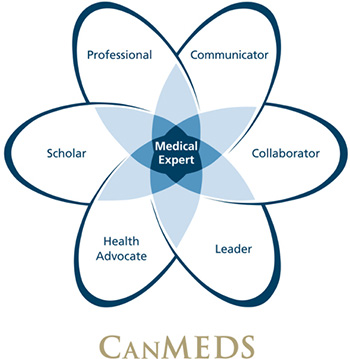CanMEDS Roles

In Core Surgery, the resident will achieve the following competencies:
Medical Expert
As Medical Experts, physicians integrate all of the CanMEDS Roles, applying medical knowledge, clinical skills, and professional values in their provision of high-quality and safe patient-centred care. Medical Expert is the central physician Role in the CanMEDS Framework and defines the physician’s clinical scope of practice.
- Practise medicine within their defined scope of practice and expertise
- Demonstrate a commitment to high-quality care of their patients
- Integrate the CanMEDS Intrinsic Roles into their practice of medicine
- Apply knowledge of the clinical and biomedical sciences relevant to their discipline
- Perform appropriately timed clinical assessments with recommendations that are presented in an organized manner
- Carry out professional duties in the face of multiple, competing demands
- Recognize and respond to the complexity, uncertainty, and ambiguity inherent in medical practice
- Perform a patient-centred clinical assessment and establish a management plan
- Prioritize issues to be addressed in a patient encounter
- Elicit a history, perform a physical exam, select appropriate investigations, and interpret their results for the purpose of diagnosis and management, disease prevention, and health promotion
- Establish goals of care in collaboration with patients and their families, which may include slowing disease progression, treating symptoms, achieving cure, improving function, and palliation
- Establish a patient-centred management plan
- Plan and perform procedures and therapies for the purpose of assessment and/or management
- Determine the most appropriate procedures or therapies
- Obtain and document informed consent, explaining the risks and benefits of, and the rationale for, a proposed procedure or therapy
- Prioritize a procedure or therapy, taking into account clinical urgency and available resources
- Perform a procedure in a skilful and safe manner, adapting to unanticipated findings or changing clinical circumstances
- Establish plans for ongoing care and, when appropriate, timely consultation
- Implement a patient-centred care plan that supports ongoing care, follow-up on investigations, response to treatment, and further consultation
- Actively contribute, as an individual and as a member of a team providing care, to the continuous improvement of health care quality and patient safety
- Recognize and respond to harm from health care delivery, including patient safety incidents
- Adopt strategies that promote patient safety and address human and system factors
Communicator
As Communicators, physicians form relationships with patients and their families that facilitate the gathering and sharing of essential information for effective health care.
- Establish professional therapeutic relationships with patients and their families
- Communicate using a patient-centred approach that encourages patient trust and autonomy and is characterized by empathy, respect, and compassion
- Optimize the physical environment for patient comfort, dignity, privacy, engagement, and safety
- Recognize when the values, biases, or perspectives of patients, physicians, or other health care professionals may have an impact on the quality of care, and modify the approach to the patient accordingly
- Respond to a patient’s non-verbal behaviours to enhance communication
- Manage disagreements and emotionally charged conversations
- Adapt to the unique needs and preferences of each patient and to his or her clinical condition and circumstances
- Elicit and synthesize accurate and relevant information, incorporating the perspectives of patients and their families
- Use patient-centred interviewing skills to effectively gather relevant biomedical and psychosocial information
- Provide a clear structure for and manage the flow of an entire patient encounter
- Seek and synthesize relevant information from other sources, including the patient’s family, with the patient’s consent
- Share health care information and plans with patients and their families
- Share information and explanations that are clear, accurate, and timely, while checking for patient and family understanding
- Disclose harmful patient safety incidents to patients and their families accurately and appropriately
- Engage patients and their families in developing plans that reflect the patient’s health care needs and goals
- Facilitate discussions with patients and their families in a way that is respectful, non-judgmental, and culturally safe
- Assist patients and their families to identify, access, and make use of information and communication technologies to support their care and manage their health
- Use communication skills and strategies that help patients and their families make informed decisions regarding their health
- Document and share written and electronic information about the medical encounter to optimize clinical decision-making, patient safety, confidentiality, and privacy
- Document clinical encounters in an accurate, complete, timely, and accessible manner, in compliance with regulatory and legal requirements
- Communicate effectively using a written health record, electronic medical record, or other digital technology
- Share information with patients and others in a manner that respects patient privacy and confidentiality and enhances understanding
Attachments
2015-11 The Five Fundamentals of Civility for Physicians
2015-11 Lessons from hip and knee arthroplasty complications
Collaborator
As Collaborators, physicians work effectively with other health care professionals to provide safe, high-quality, patient-centred care.
- Work effectively with physicians and other colleagues in the health care professions
- Establish and maintain positive relationships with physicians and other colleagues in the health care professions to support relationship-centred collaborative care
- Negotiate overlapping and shared responsibilities with physicians and other colleagues in the health care professions in episodic and ongoing care
- Engage in respectful shared decision-making with physicians and other colleagues in the health care professions
- Work with physicians and other colleagues in the health care professions to promote understanding, manage differences, and resolve conflicts
- Show respect toward collaborators
- Implement strategies to promote understanding, manage differences, and resolve conflicts in a manner that supports a collaborative culture
- Hand over the care of a patient to another health care professional to facilitate continuity of safe patient care
- Determine when care should be transferred to another physician or health care professional
- Demonstrate safe handover of care, using both verbal and written communication, during a patient transition to a different health care professional, setting, or stage of care
Leader
As Leaders, physicians engage with others to contribute to a vision of a high-quality health care system and take responsibility for the delivery of excellent patient care through their activities as clinicians, administrators, scholars, or teachers.
- Contribute to the improvement of health care delivery in teams, organizations, and systems
- Apply the science of quality improvement to contribute to improving systems of patient care
- Contribute to a culture that promotes patient safety
- Analyze patient safety incidents to enhance systems of care
- Use health informatics to improve the quality of patient care and optimize patient safety
- Engage in the stewardship of health care resources
- Allocate health care resources for optimal patient care
- Apply evidence and management processes to achieve cost-appropriate care
- Demonstrate leadership in professional practice
- Demonstrate leadership skills to enhance health care
- Facilitate change in health care to enhance services and outcomes
- Manage career planning, finances, and health human resources in a practice
- Set priorities and manage time to integrate practice and personal life
- Manage a career and a practice
- Implement processes to ensure personal practice improvement
Health Advocate
As Health Advocates, physicians contribute their expertise and influence as they work with communities or patient populations to improve health. They work with those they serve to determine and understand needs, speak on behalf of others when required, and support the mobilization of resources to effect change.
- Respond to an individual patient’s health needs by advocating with the patient within and beyond the clinical environment
- Work with patients to address determinants of health that affect them and their access to needed health services or resources
- Work with patients and their families to increase opportunities to adopt healthy behaviours
- Incorporate disease prevention, health promotion, and health surveillance into interactions with individual patients
- Respond to the needs of the communities or populations they serve by advocating with them for system-level change in a socially accountable manner
- Work with a community or population to identify the determinants of health that affect them
- Improve clinical practice by applying a process of continuous quality improvement to disease prevention, health promotion, and health surveillance activities
- Contribute to a process to improve health in the community or population they serve
Attachments
Health Advocate Assignment (Due by March 1st annually)
Scholar
As Scholars, physicians demonstrate a lifelong commitment to excellence in practice through continuous learning and by teaching others, evaluating evidence, and contributing to scholarship.
- Engage in the continuous enhancement of their professional activities through ongoing learning
- Develop, implement, monitor, and revise a personal learning plan to enhance professional practice
- Identify opportunities for learning and improvement by regularly reflecting on and assessing their performance using various internal and external data sources
- Engage in collaborative learning to continuously improve personal practice and contribute to collective improvements in practice
- Teach students, residents, the public, and other health care professionals
- Recognize the influence of role-modelling and the impact of the formal, informal, and hidden curriculum on learners
- Promote a safe learning environment
- Ensure patient safety is maintained when learners are involved
- Plan and deliver a learning activity
- Provide feedback to enhance learning and performance
- Assess and evaluate learners, teachers, and programs in an educationally appropriate manner
- Integrate best available evidence into practice
- Recognize practice uncertainty and knowledge gaps in clinical and other professional encounters and generate focused questions that address them
- Identify, select, and navigate pre-appraised resources
- Critically evaluate the integrity, reliability, and applicability of healthrelated research and literature
- Integrate evidence into decision-making in their practice
- Contribute to the creation and dissemination of knowledge and practices applicable to health
- Demonstrate an understanding of the scientific principles of research and scholarly inquiry and the role of research evidence in health care
- Identify ethical principles for research and incorporate them into obtaining informed consent, considering potential harms and benefits, and considering vulnerable populations
- Contribute to the work of a research program
- Pose questions amenable to scholarly inquiry and select appropriate methods to address them
- Summarize and communicate to professional and lay audiences, including patients and their families, the findings of relevant research and scholarly inquiry
Professional
As Professionals, physicians are committed to the health and well-being of individual patients and society through ethical practice, high personal standards of behaviour, accountability to the profession and society, physician-led regulation, and maintenance of personal health.
- Demonstrate a commitment to patients by applying best practices and adhering to high ethical standards
- Exhibit appropriate professional behaviours and relationships in all aspects of practice, demonstrating honesty, integrity, humility, commitment, compassion, respect, altruism, respect for diversity, and maintenance of confidentiality
- Demonstrate a commitment to excellence in all aspects of practice
- Recognize and respond to ethical issues encountered in practice
- Recognize and manage conflicts of interest
- Exhibit professional behaviours in the use of technology-enabled communication
- Demonstrate a commitment to society by recognizing and responding to societal expectations in health care
- Demonstrate accountability to patients, society, and the profession by responding to societal expectations of physicians
- Demonstrate a commitment to patient safety and quality improvement
- Demonstrate a commitment to the profession by adhering to standards and participating in physician-led regulation
- Fulfill and adhere to the professional and ethical codes, standards of practice, and laws governing practice
- Recognize and respond to unprofessional and unethical behaviours in physicians and other colleagues in the health care professions
- Participate in peer assessment and standard-setting
- Demonstrate a commitment to physician health and well-being to foster optimal patient care
- Exhibit self-awareness and manage influences on personal well-being and professional performance
- Manage personal and professional demands for a sustainable practice throughout the physician life cycle
- Promote a culture that recognizes, supports, and responds effectively to colleagues in need

